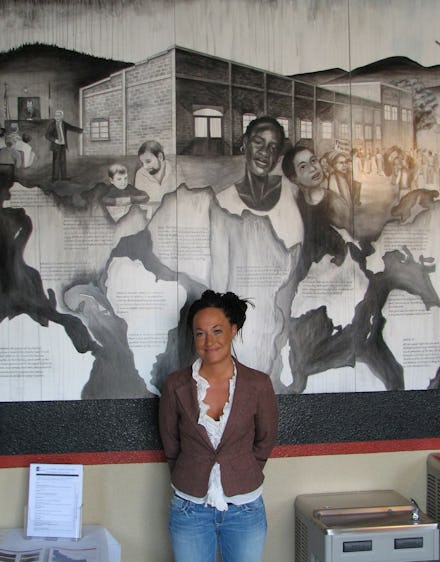The Huge Problem With the Rachel Dolezal Scandal That Everyone Needs to Know

On Thursday, Rachel Dolezal, the 37-year-old head of the local NAACP chapter in Spokane, Washington, evaded questions from KXLY that she lied about her racial identity and falsely identified a black man as her father. Despite passing herself off as a black woman for years (and reportedly getting paid to talk about said identity), Dolezal, it turns out, is white. Her parents, Ruthanne and Larry Dolezal, confirmed as much by phone to the Spokesman-Review.
The fiasco is a glaring example of white privilege in action. During a moment when so many are finally speaking out about the unceasing police abuse brutalizing black Americans — most recently seen with the McKinney, Texas, pool incident — news of Dolezal is now taking up much-needed space in media and public dialogues. The constant re-centering of racial conversations on whiteness and the excessive focus on white lives are two of the most prominent features of white privilege.
The hashtag #transracial is now trending on Twitter, for example, as if notions of racial ambiguity or post-racialism are somehow new entry points into our understanding the history of race and racism in the U.S. These are not new conversations, even if a white woman posing as black may make it seem as if they are.
To make matters worse, some are carelessly equating the so-called "transracial experience" with that of transgender people, ignoring, for one thing, that however socially constructed markers of racial divisions may be, skin color is hereditary.
To be clear, in attempting to pass as black, Dolezal falsely represented her identity. Trans people don't lie about their gender identities — they express their gender according to categories that reflect who they are.
Dolezal practiced cultural theft. There's a stark difference between racial indeterminacy, or the idea that race is not fixed and individuals may have multiple racial identities, and racial misrepresentation. Racial misrepresentation is cultural theft.
Cultural appropriation is a contested activity in the U.S., especially in the realms of artistry, but cultural theft committed with the purpose of gaining access to positions or institutional power is more insidious. This is what Dolezal did. According to the Washington Post, for example, when Dolezal "applied to Howard University to study art with a portfolio of 'exclusively African-American portraiture,' the university 'took her for a black woman' and gave her a full scholarship."
"You've got a white woman coming in that got a full-ride scholarship to the black Harvard," Dolezal's father, Larry Dolezal, told the Washington Post.
Later, Mayor David Condon of Spokane appointed Dolezal as chairwoman of an independent citizen police ombudsman commission. According to CNN, she identified herself as "at least part African-American" in her application for appointment to the commission.
"Black privilege is a myth, is a joke, is a punchline, is a time a teacher asks a little boy what he wanted to be when he grew up and he said alive," poet Crystal Valentine stated at a college poetry slam in April.
It takes a certain amount of entitlement to claim blackness as an identity category, and even more to move about society falsely representing oneself while gaining access to areas because of the color of one's skin. That is a privilege black people do not have.
But white privilege is a truth. And it is perhaps no more obvious than when a white woman, posing as a black woman, achieves prominence while fighting on behalf of the people she has betrayed.